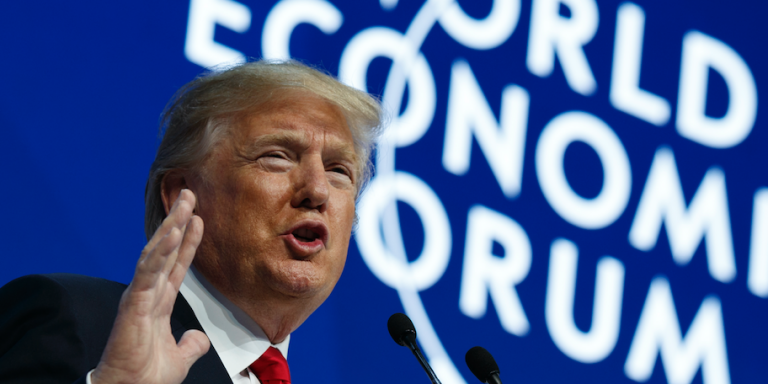INTELBRIEF
January 29, 2018
IntelBrief: America First at Davos

- On January 26, United States President Donald Trump delivered a high-profile speech at the World Economic Forum in Davos, Switzerland.
- In the speech, President Trump stressed the positive economic news in the U.S. and reaffirmed his preference for bilateral trade deals.
- While the speech was noticeably less nativistic than the president’s usual rhetoric, there remains significant tension between the U.S. and the E.U.
- France, in particular, is urging multilateralism to address global challenges, while the U.S. continues to move in the opposite direction.
In his January 26, 2018, speech at the World Economic Forum (WEF) in Davos, Switzerland, President Donald Trump stated ‘America First’ did not mean ‘American Alone;’ a growing concern for U.S. allies. As fitting an economic summit, the president’s speech was focused on the healthy U.S. economy. Trump stated that when the U.S. economy does well, the rest of the world benefits. Confirming his strong focus was the American worker, and with other world leaders focused on their respective economies, Trump declared an interest in economic prosperity as the common thread running between like-minded countries.
The speech was far less bombastic and nativistic than the president’s usual rhetoric, both during his presidential campaign and in his first year of office. The issue of immigration (and the unstated but related issue of refugee assistance and resettlement) was mentioned as it related to the harm it causes U.S. workers. While statistics show otherwise—historically, immigration into the U.S. has not depressed wages nor led to crime— the president stated that national sovereignty, as it is defined by his administration, would remain the cornerstone of U.S. economic and foreign policies.
The speech was well-tailored for Davos, which is attended by leaders of finance and industry, as well as heads of state. The typical anti-globalism bent in President Trump’s domestic speeches, tweets, and policies was noticeably toned down, and his remarks were relatively well received.
President Trump stated that intent to individually negotiate deals with the 11 countries that are part of the Trans-Pacific Partnership, an enormous trade agreement that he pulled the U.S. out of early in his term, further declaring he might negotiate with a group of like-minded TPP countries if the focus was on ‘fair trade’ over ‘free trade.’ It is unclear if those who are part of the TPP will individually negotiate separate trade deals with the U.S.; the point of creating the partnership was having a unified multilateral approach to trade.
The preference for bilateral deals over multilateral agreements is one of the biggest differences between the U.S. and the E.U.—particularly Germany and France. The U.S.’ position is increasingly difficult to advance given the sheer global nature of modern trade and finance. French President Emmanuel Macron warned of a ‘race to the bottom’ in global trade with countries constantly lowering taxes to attract industries, a move that decimates economies with strong social safety nets and worker benefits, a hallmark of the E.U. The coming year will see more tension and a further rift between the U.S. and the E.U over not only a bilateral versus multilateral approach but of a healthy national economy versus strong markets.
For tailored research and analysis, please contact: info@thesoufancenter.org
[video width="960" height="540" mp4="https://thesoufancenter.org/wp-content/uploads/2018/01/Final-Edit-1-119.mp4" poster="https://thesoufancenter.org/wp-content/uploads/2018/01/Screen-Shot-2018-01-29-at-13.37.19.png"][/video]